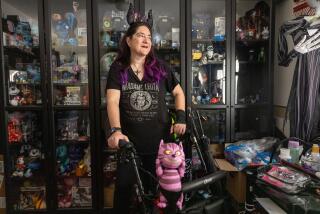Everyday Tasks Help Prove Point : Disability: Able-bodied volunteers adopt a handicap for a few hours to test how public facilities could be more accessible.
- Share via
POMONA — The list of tasks was simple enough: Get a drink of water at the library, go up the ramp entrance to the school district office, make a deposit at a bank, cross Garey Avenue and buy a soda at a Mexican restaurant.
But these everyday errands, normally so easy to accomplish, became a grueling test Thursday when a group of able-bodied Pomona officials and members of the business community made themselves “disabled” for a time on what was billed as Access Awareness Day.
They found that the Pomona library water fountain cannot be used from a wheelchair, that the ramp for handicapped access to the school district office is so steep that people in wheelchairs cannot push themselves up it without assistance, that the deposit slips at a downtown bank are on a counter too high to be reached from a wheelchair, that traffic signals often change before a wheelchair can be pushed across a street and that there is no way to get a wheelchair through the door of a popular Mexican restaurant.
“I had problems at every stop,” said Planning Commissioner Eddie Cortez, one of a dozen city and school officials and business leaders who volunteered to “adopt” a disability for a morning.
About half were in wheelchairs; others chose to wear blinders, or earplugs or to become mute. Some went to work at their regular jobs; others followed a course from the Civic Center to downtown and back.
Joan Western, a Building Department plan checker, elected to be blind. Even with a guide to help her on her 12-block walk through the heart of the city, she had trouble with tree branches, bus benches and sidewalk imperfections.
Ironically, Western said, she saw more with her eyes shut than she often sees on her regular walks in the area. “My eyes have been opened to what people have to endure,” she said.
James J. Miller, a city building official, said spending time in a wheelchair persuaded him that when builders try to skimp on compliance with codes governing handicapped access, he needs to be firm.
Miller said he saw several cases where building improvements were made that planners “thought were making things accessible, but weren’t.” Even a minor deviation in plans for handicapped access, he said, can cause extreme hardship to those who need the access.
Debbie Barcelona, a state employment office representative, who also chose a wheelchair, said people saw her as an obstacle to get around.
“A lot of people are in a hurry and they see you coming and they think you’re going to take all day to get that door open and slow everything down,” she said.
Even when she was crossing a street, Barcelona said, motorists seemed to look at her with impatience.
Annette Barnett, who works with a private organization that helps find jobs for disabled clients, said she had a similar experience.
“People won’t look at you,” she said. “I didn’t get eye contact.”
Barnett, a marathoner who also has lifeguard training, said pushing herself in a wheelchair was drudgery. “I’m literally exhausted,” she said. “My arms are killing me.”
The difficulties experienced by the volunteers did not surprise the disabled people who joined the volunteers for lunch Thursday at the Moose Lodge to conclude the program, which was sponsored by the Pomona Committee on Disabilities, a community group.
Ed Uhl-Tessier, paralyzed in a surfing accident as a teen-ager 10 years ago, said spending a few hours in a wheelchair makes a person realize that a disability does not change who a person is but how he is treated.
Uhl-Tessier said changes come when people recognize that the problem is not the disability but the environment in which the disabled person lives. Instead of “viewing a disability as a tragedy,” he said, people should view “a handicapped environment as a travesty. . . . This is what changes cripples into crusaders.”
Uhl-Tessier, who runs an organization that advises public agencies and private companies on how to make facilities accessible to the handicapped, said that enormous progress has been made in the past 30 years but that more needs to be done. What people with disabilities are seeking, he said, is “empowerment, not pity.”
More to Read
Sign up for Essential California
The most important California stories and recommendations in your inbox every morning.
You may occasionally receive promotional content from the Los Angeles Times.













